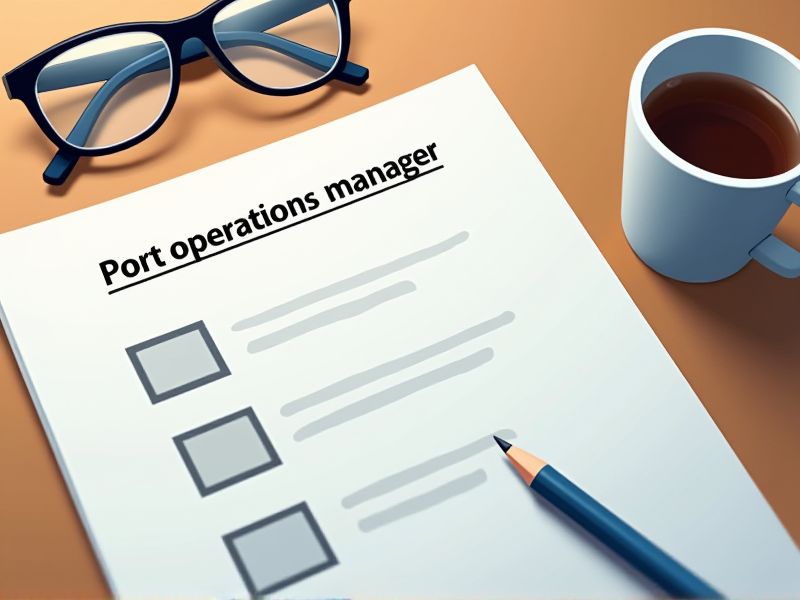
Port operations managers oversee complex logistics and ensure the seamless flow of goods, crucial for global trade. Certifications equip these professionals with the necessary skills to handle challenges like regulatory compliance and risk management. They also provide updated knowledge on emerging technologies and best practices, reinforcing operational efficiency. Here are some important certifications you may need as a Port operations manager.
Certified Port Executive (CPE)
Certified Port Executive (CPE) certification enhances an operations manager's expertise by providing comprehensive knowledge of port and terminal operations. An operations manager with CPE designation is equipped to implement industry best practices, improving efficiency and safety. CPE-certified managers often gain access to a network of professionals, fostering collaboration and knowledge sharing in the maritime industry. Many organizations recognize the CPE as a mark of professionalism, thereby increasing credibility and career advancement opportunities for the operations manager.
Certificate in Port Operations Management (CPOM)
A Certificate in Port Operations Management equips port operations managers with the necessary skills required to oversee complex logistics and ensure efficiency within the port. As global trade intensifies, proficiency in CPOM offers specialized knowledge in cargo handling, maritime safety, and regulatory compliance, critical for business optimization. A CPOM credential enhances problem-solving abilities in supply chain disruptions, enabling swift adaptation to challenges. Accreditation in this field elevates a manager's credibility and can lead to career advancement and better decision-making capabilities in the competitive maritime industry.
International Port Management Certification (IPMC)
International Port Management Certification (IPMC) enhances a port operations manager's understanding of global port standards and practices, which improves operational efficiency. It ensures managers stay up-to-date with the latest security protocols, reducing the risk of breaches or disruptions. Certification facilitates better compliance with international regulations, mitigating potential fines or legal issues. By possessing IPMC, managers gain a competitive edge in the industry, contributing to career advancement and organizational success.
Certificate in Maritime Operations
A Certificate in Maritime Operations equips a Port Operations Manager with specialized knowledge essential for coordinating complex logistics in port environments. Effective port management requires understanding of maritime laws, which this certification covers, ensuring compliance and reducing legal risks. The certification provides insights into port safety protocols, critical for minimizing accidents and maintaining continuous operations. Advanced technical skills gained improve decision-making efficiency in managing port resources and optimizing traffic flow.
Maritime Safety and Security Certification
Maritime Safety and Security Certification equips a port operations manager with knowledge to effectively oversee and implement safety protocols, minimizing the risk of accidents and enhancing operational efficiency. This certification ensures compliance with international maritime regulations, which is crucial for maintaining port reputation and avoiding legal repercussions. Familiarity with security procedures through certification helps in mitigating risks associated with illegal activities such as smuggling or piracy. The training also prepares managers to respond effectively to emergencies, ensuring the safety of personnel and cargo.
Project Management Professional (PMP)
Project Management Professional (PMP) certification equips port operations managers with structured methodologies necessary for overseeing complex projects, which enhances efficiency and execution. The certification instills a standardized approach to risk management, crucial for navigating unpredictable port challenges. With a PMP, managers can ensure better alignment of port projects with strategic goals, leading to improved organizational outcomes. It facilitates enhanced cross-functional team collaboration, vital for smooth port operations and logistics coordination.
Certified Supply Chain Professional (CSCP)
A Certified Supply Chain Professional (CSCP) provides in-depth understanding of global supply chain management, which is crucial for effectively managing the complex logistics of port operations. This certification equips port operations managers with advanced knowledge of supply chain technologies and strategies, enabling them to optimize cargo handling and reduce operational costs. It enhances their ability to forecast supply chain trends, improving decision-making regarding resource allocation and scheduling. The CSCP credential also reinforces the manager's capability to ensure compliance and maintain high standards of efficiency in various port activities.
Lean Six Sigma Green Belt Certification
Lean Six Sigma Green Belt Certification equips a Port Operations Manager with skills for optimizing processes, which directly reduces operational inefficiencies. Enhanced problem-solving techniques from the certification can lead to quicker resolution of bottlenecks and improve cargo throughput. Mastery in data-driven decision-making can help in maintaining high safety standards while minimizing waste. Training in effective team management ensures improved communication and collaboration among diverse port teams.
Occupational Safety and Health Administration (OSHA) Certification
Port operations involve handling heavy machinery and hazardous materials, increasing the risk of accidents without proper safety protocols. OSHA certification equips managers with the necessary knowledge to implement safety regulations effectively, reducing workplace injuries and associated costs. When managers hold OSHA certification, it signals to employees and stakeholders that safety is a top priority. Compliance with OSHA standards can also prevent costly fines and legal actions, safeguarding the organization's financial and reputational interests.
International Maritime Organization (IMO) Safety Certificate
The IMO Safety Certificate ensures that port operations adhere to international safety standards, minimizing the risk of maritime accidents. Compliance with these standards is critical to avoid costly downtime and potential legal liabilities. It fosters trust among international shipping companies, enhancing the port's reputation and attracting more business. Proper certification also facilitates smoother inspections and audits, expediting operational workflows.
Summary
As a Port Operations Manager, obtaining relevant certifications can lead to enhanced operational efficiency and safety compliance. This often results in improved logistics coordination and cost management, directly impacting the port's financial performance. Certified managers also typically exhibit greater leadership skills, fostering a collaborative work environment among teams. Ports with certified managers frequently gain competitive advantages, attracting more business and strategic partnerships.
